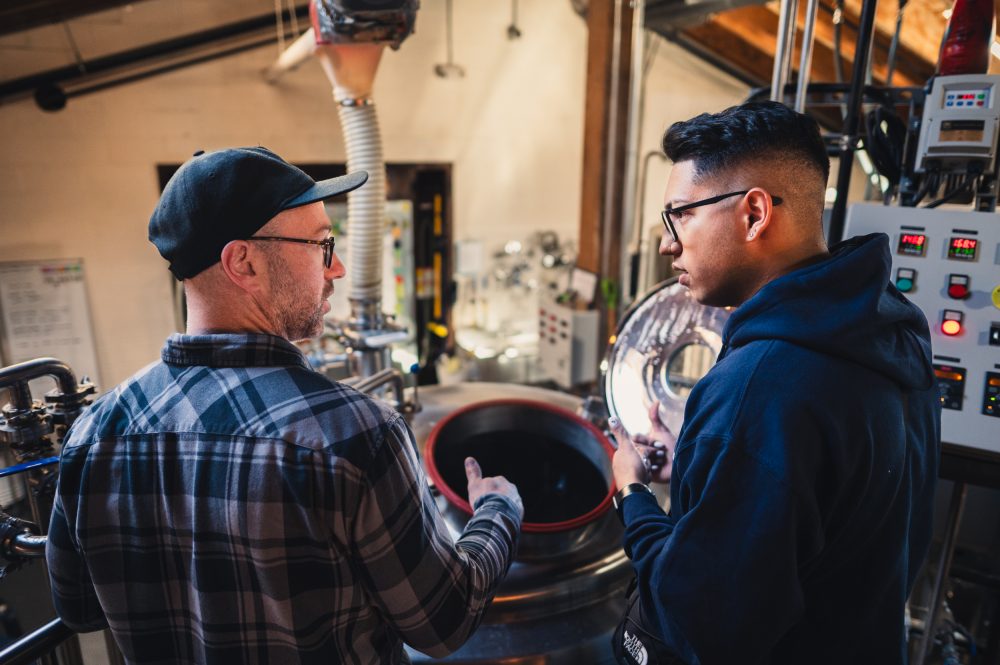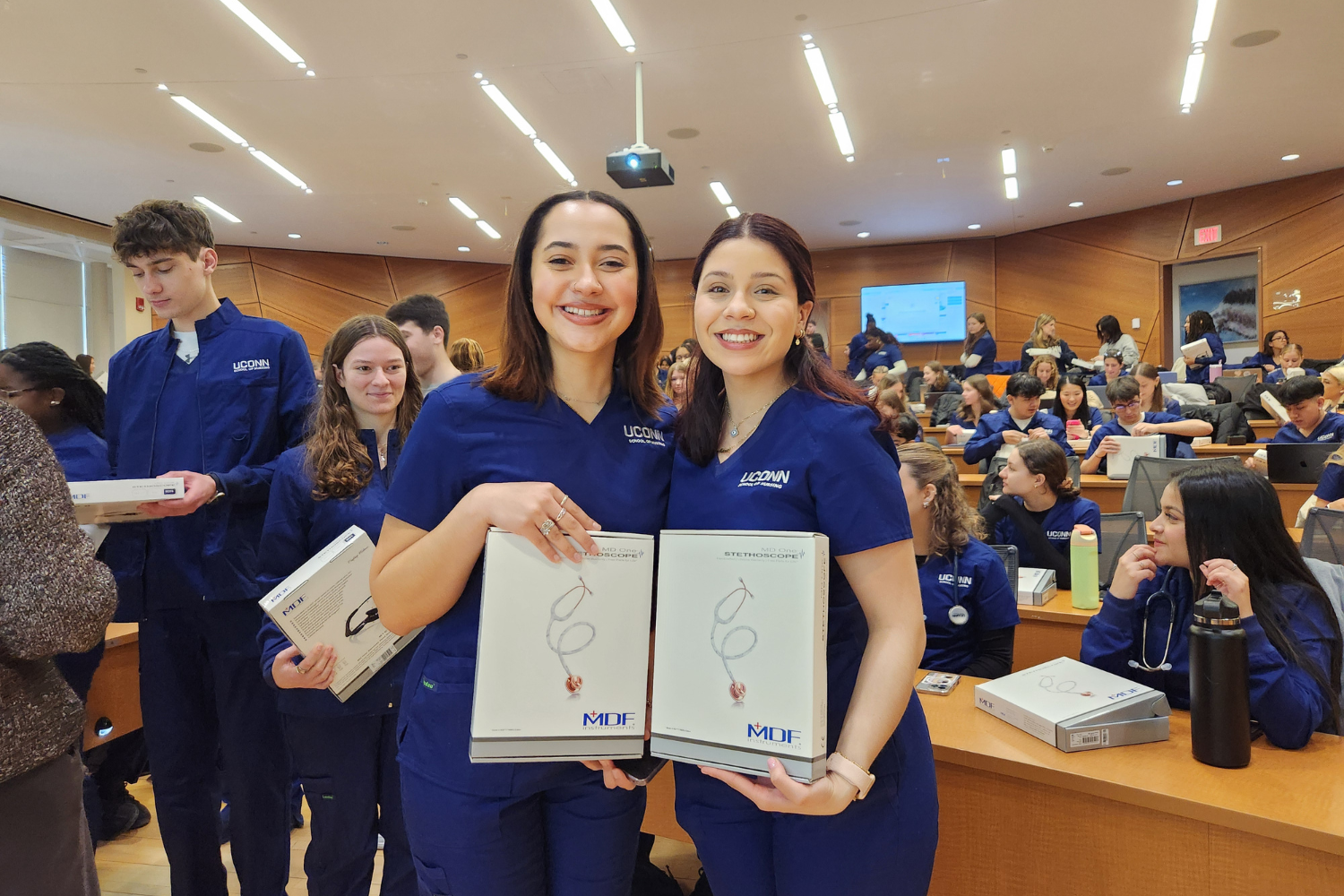Chemical engineers monitor temperature, pH, volumes, pump speeds, and valves. They carefully select and tweak ingredients, picking a particular mix of water, lactic acid, potassium hydroxide and the like.
But for nine students in UConn’s Chemical and Biomolecular department’s Introduction to Brewery Engineering course, adding malt, hops, and yeast takes the mixture up a notch.
Brewing is a classic example of the chemical engineering process, with chemical engineers being “process” engineers to improve brewing procedures and create delicious beer.
Brewing involves malt extraction, hops addition, and fermentation, requiring knowledge in reaction engineering, separations, heat transfer, and process control.
The course launched three years ago by Jennifer Pascal, associate professor in residence of chemical and biomolecular engineering and associate department head.
“Modern brewers are chemical engineers through-and-through,” Pascal says. “From sanitizing equipment to carbonating the final product and the packaging process, brewing is an intricate science involving a multitude of engineering concepts. Brewing is not for the faint of heart, or the casual ‘grab-a-pint-after-work’ drinker.”

Senior Design
The course is part of the capstone UConn Engineering Senior Design project. During Senior Design, students work hand in hand with faculty and industry sponsors, crafting solutions for real-world problems or opportunities in manufacturing, hospitality, sustainable energies, construction trades, healthcare and more.
The year-long projects conclude with Senior Design Demonstration Day at the end of April in Gampel Pavilion, which is a chance for students to showcase their project findings to faculty, families, sponsors, alumni, and friends.
In 2022 and 2023 demonstrations, student teams introduced design elements to improve sustainability in a pilot-scale brewery.
These updates include integrating UConn’s reclaimed water facility into the process, carbon dioxide capture from fermentation, and updated risk assessment.
The team identified potential hazards in the pilot-scale brewery and created a risk assessment tool and standard operating procedure.
These efforts provide UConn with a foundation to launch a pilot-scale brewery where students can learn the fundamentals of fermentation science, hence, the beginning of UConn Brewing Innovation.
This year, students worked on their first commercially available beer. BrewConn is being sold this month at the Kinsman Brewing Co. in Southington. Students debuted the double dry hopped hazy IPA in a UConn Foundation event late last month.
The semester was a challenge for students, with even bigger goals for 2024.
“Moving forward I believe the biggest challenge will be dissecting the beer brewing process to fully understand its chemical reactions, applying the engineering concepts to achieve our goals,” says chemical engineering and Spanish dual major Riquelmy Torres ‘25. Torres is part of the five-year Engineering Spanish Program and will study abroad in Spain later next year.
Other students are looking forward to creating different types of beer, like Hailey Tam ‘25, a chemical engineering major with a minor in materials science and engineering.
“The most challenging part has been trying to see what we can implement to make the beer non-alcoholic and something that is feasible for Kinsmen to use in their brewery,” Tam says. “We have a few ideas that we are going to try out next semester. Hopefully one will work and Kinsmen can use it.”

College of Engineering Dean Kazem Kazerounian applauds the students for their interesting and appealing capstone projects.
“Craft brewing is a very strong industry,” Kazerounian says. “There is no shortage for opportunity in the food and beverage fields, and this high-quality beer is proof that our students make true impact in any career they pursue.”
Engineering Undergraduate Program Administrator Monica Bullock, who also oversees the logistical operations of Senior Design Demonstration Day, says that Connecticut is poised to be epicenter of the craft brewery trade in the nation.
“Our state is home to fantastic breweries and small neighborhood pop-ups,” Bullock says. “Connecticut has led this effort for years, and it’s exciting to see our students securing this prestigious identity for our state. We are very proud of them and look forward to seeing their continued impact in the industry.”
UConn Brewing Innovation
UConn Brewing Innovation is an interdisciplinary initiative led by the College of Engineering, School of Business, and College of Agriculture, Health, and Natural Resources. In 2022, Pascal joined with Engineering’s Director of Technical Services Peter Menard and Business’s executive director of the Connecticut Center for Entrepreneurship and Innovation Jennifer Mathieu in ideation sessions with Greenhouse Studios.
“UConn is strongly positioned to support the brewing industry from farm-to-pint,” says Menard, who has homebrewed for more than two decades. “I’m looking forward to helping support the local businesses that are essential to Connecticut’s economy, while helping our students strengthen their understanding of engineering.”

Other team leaders of UConn Brewing Innovation include Rachel Ayers of the School of Business, Peter Fulton of the College of Engineering, and Sydney Everhart of the College of Agriculture, Health, and Natural Resources.
Chemical Engineering’s Different Flavors
UConn’s chemical and biomolecular engineering students graduate and innovate in varied fields. Traditionally, chemical engineers have a stronghold in the oil and gas field. However, as students, faculty and staff imbibe this month in a student-created beer, opportunities like UConn Brewing Innovation show that that may no longer be the case.
“Chemical engineers study reactions and mixing, marrying ingredients to create a finished product that helps people live, work and play,” says Associate Professor, Associate Dean for Undergraduate Education, and Castleman Term Professor in Engineering Innovation Daniel Burkey. “It’s tough to think about a better example of those concepts than in brewing or distilling. Cheers to these innovative students and the faculty and staff that are opening doors to them.”



